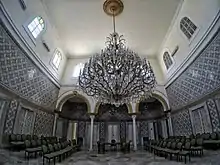Lalla (title)
Lalla is a Berber language word meaning "Lady", "My lady", "Miss." or "Mrs.". The title "Lalla" is used in Morocco, Algeria, Tunisia and Libya to politely address or mention any woman. The title "Lalla" is also used by Moroccans to politely greet or call any unknown or adult woman as a placeholder for her name. If the respected or adult woman is known to the person, he or she would address her using the title "Lalla" before using her personal name or family name.

The title "Lalla" has always been in standard use by the many royal families of Morocco and by the defunct royal families in the Republic of Tunisia as a title for each and every princess and king's wife. It is also used as a fixed honorary title in combination with the woman's personal name as a sign of distinction given to women from royal or tribal families among the people of North Africa.
In many place names and mausoleums in North Africa, the title "Lalla" can also be understood as "female saint".
In the Berber language, the word "Lalla" can also mean in some regions: "older sister", "older female cousin", "aunt", "mother-in-law", etc. The word has dialectal varieties like "Řalla" and "Řadja" but the form "Lalla" is the most common. The Berber word "Lalla" is derived from the Berber word "Alallu" which means "dignity". The Berber word for "freedom" which is "Tilelli" is related to this semantic field.
The title "Lalla" is known and used by all North Africans whether they speak the Berber language or not.
Notable Lalla
Celebrities and Princesses
- Lalla Fatma N'Soumer (1830–1863), heroine of the Kabyle resistance (Algeria) against the French colonial empire.
- Lalla Chella, wife of the Sultan of Merinid and Abbessine origin Abu al-Hasan and whose necropolis is located in Chellah, Morocco.
- Lalla Zoulikha Oudai, Algerian resistant during the Algerian war.
- Lalla Traki (18..–1919), daughter of Muhammad IV of Tunisia and wife of Muhammad VII.
- Lalla Khedaoudj El Amia, daughter of Hassan El Khaznadji, treasurer of Dey Baba Mohammed ben-Osman (Dey of the regency of Algiers in the 18th century).

- Lalla Kmar (1862–1942), queen consort of Tunisia during three reigns, after having successively married Muhammad III Sadiq, Ali III and Muhammad V
- Lalla Jeneïna (1887–1960), last queen consort of Tunisia and wife of Muhammad VIII, last king of Tunisia.
- Lalla Aïcha (1906–1994), first daughter and eldest child of King Muhammad VIII of Tunisia.
- Lalla Abla (1909–1992), wife of King Mohammed V of Morocco and mother of King Hassan II of Morocco.
- Lalla Lilia (1929–), daughter of Muhammad VIII, last king of Tunisia.
- Lalla Malika (1933–), sister of King Hassan II, and daughter of King Mohammed V of Morocco.
- Lalla Latifa (1945–), widow of King Hassan II, and mother of King Mohammed VI of Morocco
- Lalla Salma (1978–), princess consort of Morocco and wife of King Mohammed VI of Morocco.
- Lalla Meryem (1962–), first daughter and eldest child of King Hassan II of Morocco and sister of King Mohammed VI.
- Lalla Asma (1965–), daughter of King Hassan II of Morocco and sister of King Mohammed VI.
- Lalla Hasna (1967–), daughter of King Hassan II of Morocco and sister of King Mohammed VI.
- Lalla Khadija (2007–), daughter of King Mohammed VI of Morocco.
Saints
- Lalla Khlidja, also called Yemma Khlidja, woman poetess and saint Kabyle woman of the tribe of Imchedalen.
- Lalla Maghnia, saint who gave her name to the city of Maghnia in Algeria.
- Lalla Mimouna, saint, celebrated by the Jews of the Maghreb known throughout the Maghreb, especially in Morocco and Algeria. The city of Lalla Mimouna located in the province of Kenitra in Morocco bears his name. Jewish families in Tlemcen, Algeria, celebrate Mimouna in tribute.
- Lalla Manoubia, Tunisian saint of great renown. A hagiographic account entitled Manâqib is dedicated to him.
- Lalla Aziza, saint celebrated by the Amazighs of the Seksawa of the High Atlas. 16th century woman who had played a role in resistance to the Merinids. It introduced Sufism into the region and marked the independence of the Seksawa.
- Lalla Rahma Youssef, saint of Massa, in the Sous region of Morocco.
- Lalla Manna (18..–1939) or Emna Ben Hammouda, known to be one of the righteous saints of Tunisia.
Tombs and mausoleums

- Tomb of Lalla Aziza, located in the country Seksawa, in the High Atlas, in Morocco.
- Mausoleum of Lalla Mennana, in Tunis, Tunisia.
- Mausoleum of Lalla Yemna, located at the top of Mount Gouraya in Bejaïa, in Kabylia, Algeria.
- Mausoleum of Lalla Manoubia, located in El Gorjani, in Tunis, Tunisia.
Others
- Treaty of Lalla Maghnia.
- Mosque of Lalla Saïda.
- Museum of Lalla Hadria, museum in Djerba, Tunisia.